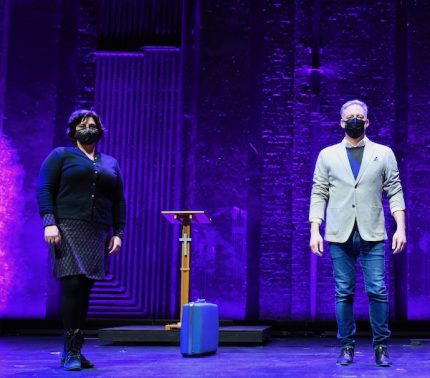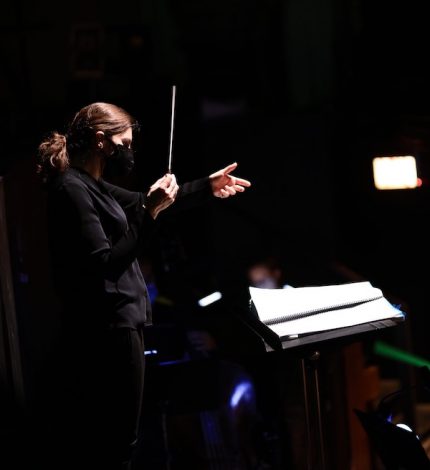COT to premiere expanded version of Sankaram’s “Taking Up Serpents”

Chicago Opera Theater continues its adventurous digital season with a streamed production of Kamala Sankaram’s recent opera Taking Up Serpents. COT will present a revised version of the opera, premiered by Washington National Opera in 2019, beginning Saturday night. The composer and her librettist, Jerre Dye, spoke by phone recently about how the work has evolved.
The story follows Kayla, a young woman who has fled the oppressive influence of her father in Alabama. Known in the opera as Daddy, he is a rough and hard-drinking man who finds the Lord, proving his faith to his congregation by picking up poisonous snakes. Working at a discount superstore, Kayla is brought back into her father’s world when her mother, Nelda, calls to tell her that her father is in the hospital and about to die from a snake bite.
Sankaram explained that the opera had to be an hour or less to meet the criteria imposed by Washington National Opera in 2019. “It was so compact in D.C. There were particular things that we knew we wanted to try and address in making this new version,” she added. “Now it’s about an hour and fifteen minutes. The piece breathes more now. It’s not as compact, but I think it didn’t want to be too much longer.”
The element both composer and librettist wanted to expand was the role of Daddy. “We didn’t get to see why Kayla wants to go back to this church and to this family,” Sankaram explained. “We added some scenes of the actual church service, where he is at the height of his powers and charismatic. That happens early on, and then we also revisited what was the instigating event that caused her to run away from home.”
Jerre Dye drew on his own childhood in Mississippi for the basic shape of the libretto. “We had a family friend who started a church,” he said. “A Pentecostal-Evangelical church, very grass roots, kind of old-school tent revival energy.” No snakes, he confirms, but other gifts of the Holy Spirit were in evidence. “There was speaking in tongues and faith healing. It made quite an impression on me as a kid.”
The characters are not based on members of his family. “Did I know Nelda? Absolutely. Did I know Kayla? Absolutely. All these folks are very familiar folks that I encountered,” he added. “Luckily, my daddy was not quite like Daddy. Our preacher was a very charismatic guy, very dashing, who took up a lot of space. When Kamala and I were first playing around with archetypes, definitely Johnny Cash came into play: that intense, charismatic male swagger.”
Dye noted that the singer taking the role of Daddy in this production, baritone Michael Mayes, has exactly this quality. “He’s able to fill up the space in such a beautiful way,” he told me. Expanding the church scene allowed the addition of a Praise Band, a rudimentary ensemble that often accompanies singing in a Pentecostal service. “One of the things I felt we were missing,” Dye said, “was the feeling of rattley, live energy that happens in churches like this.”

Lidiya Yankovskaya, COT’s music director, conducted the work at its Washington premiere and is proud now to conduct this revision. “Obviously I was a big fan of it, so I brought it to Chicago,” she said by phone. She agrees that the biggest change is the added church scene. “The energy of that moment, this sublime feeling that comes across, brings us into that world. It highlights all of those things that opera can do so well. It can express at least partially what people feel when they go to church and why religion is important to them.”
Taking big risks, COT brings the expanded version of the opera to its planned premiere as we near the one-year mark of the coronavirus pandemic. Online audiences will watch a digital recording that tries to capture something of the essence of a live performance in the Studebaker Theater, the company’s home. The video was captured in a single run-through, with shots called live for the crew handling six cameras, as they would be at a sports event.
The experience of hearing people making music together live is what we all crave at this point in the pandemic. Some listeners may still think that groups can perform together online, which they cannot in music that has to line up temporally. “I think we did ourselves a disservice early on,” said Sankaram, “in that everybody put out these videos that were edited to make it look like they were playing together in real time. So then there was this expectation that you could do it.”
The lead singers quarantined in a bubble together so that they could be near one another in performance. They sang on the stage, a considerable distance from the orchestra pit, while a trio of supporting singers performed from far back in the house, coordinated with the conductor by video link. The orchestral musicians were also distanced from one another in the pit, with those who could not wear masks surrounded by large plastic barriers.
Dye, who also directed this production, was optimistic after the final dress rehearsal. “Fingers crossed, the feeling was in the air,” he said. “We miss that audience, I’m not going to lie. The only people allowed into the space are the people involved in it, to make sure everyone is safe. There’s been a lot of care in the rehearsal process to establish trust, an extra level of trust needed because a lot is at stake.” All the precautions paid off, as no one contracted Covid19.
Yankovskaya, who was interviewed after the video shooting was concluded, confirmed that they had one take that would work, stem to stern. “This is not going to be an edit or a splice with patches or anything like that,” she enthused. “Jerre found some great ways to use film, in a way that you can’t in a normal opera production. That, to me, was the exciting part about this project. It wasn’t just a filming of a staging, it was really a project created for film in the current situation.”
After a year of isolation, making music together was intense, according to Dye. “After a year on Zoom, finding yourself, albeit masked, in a room with all these amazing people is pretty beautiful,” he said. “We’ve podded and quarantined our primary cast together, so they get to do all of the things that we used to do. When the masks came off and the voices filled the space – it was emotional for people.”
All three artists agreed that the revisions have deepened the message of the opera, adding musical sincerity to the characters’ faith. “What would it mean if we could be free of the past and move forward?” Dye mused. “Kayla is on a certain faith journey, and I’d like to think that she’s able to let go and move forward, shedding what is no longer necessary. What does moving forward even look like? It’s what the piece addresses in lots of ways.”
Yankovskaya thinks Sankaram’s unusual orchestration helps the listener understand why people are comforted by a charismatic faith like Daddy’s. “It’s that feeling of release, of freedom, that we don’t get anywhere else,” the conductor said. “In that opening music and in the way Jerre has staged it, we get the sense of people who feel like they can be themselves, be totally free of societal constrictions that are placed upon them or are self-imposed in their daily lives.”
“COT’s focus has been on presenting works that are overlooked,” Yankovskaya concluded. “Certainly this is a story that has not yet been told. Although it’s a very American story, it’s one that is not often in the public eye. If it is [told], it’s always in a very negative way. Any good story is told from many different perspectives. What makes this story great is that it is complicated, and it embraces those various perspectives beautifully.”
Chicago Opera Theater presents the Chicago premiere of Taking Up Serpents 7:30 p.m. February 27. chicagooperatheater.org
Charles T. Downey has served as Associate Editor and Lead Critic of Washington Classical Review since its founding in 2016 and has published freelance classical music reviews for the Washington Post since 2008. He holds a Bachelor of Music in piano from Michigan State University, and M.A. and Ph.D. in musicology from The Catholic University of America, with research specializations in Gregorian chant and French Baroque ballet and opera. He lives on Capitol Hill and waits impatiently for the return of live concerts.
Posted in Uncategorized




